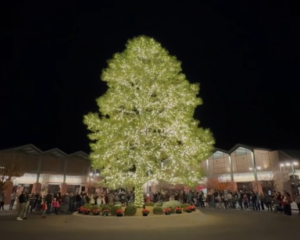As the leaves hint at autumn, Jewish communities around the world prepare for Rosh Hashanah, the Jewish New Year—literally, the “head of the year.” In 2025, Rosh Hashanah begins at sundown on Monday, September 22, and concludes at nightfall on Wednesday, September 24. This solemn yet hopeful holiday ushers in the Ten Days of Awe, a sacred period of reflection, repentance, and renewal leading toward Yom Kippur.
LOCAL NEWS: 100 best places to work and live in Arizona for 2025
INDUSTRY INSIGHTS: Want more news like this? Get our free newsletter here
A Holiday of Reflection
Rosh Hashanah marks the anniversary of the creation of the world in Jewish tradition, and it begins the Ten Days of Awe — a period of introspection leading to Yom Kippur, the Day of Atonement. Unlike the secular New Year’s Eve, which often emphasizes celebration, Rosh Hashanah blends joy with solemnity. It is a moment to take stock of our actions, seek forgiveness, and set intentions for the year ahead.
The synagogue service is central to the observance. One of the most stirring rituals is the sounding of the shofar, a ram’s horn blown in a series of ancient calls meant to awaken the spirit and inspire a return to one’s best self. The liturgy is rich with themes of renewal, the fragility of life, and the enduring hope for a more just and compassionate world.

Traditions that Nourish
Around the table, Rosh Hashanah is infused with symbolic foods. Apples dipped in honey are perhaps the best-known — a sweet wish for a sweet year ahead. Round challah bread, often studded with raisins, symbolizes the cyclical nature of time. Some families serve pomegranates, their many seeds representing the hope for abundant blessings. In many Sephardic homes, a “seder” of symbolic foods includes leeks, dates, and pumpkins, each accompanied by special blessings.
Arizona’s Jewish Roots and Rosh Hashanah
Jewish life in Arizona dates back to the mid-19th century, when Jewish merchants, traders, and ranchers settled in mining towns and developing cities. These early pioneers often gathered in private homes or rented halls to observe the High Holy Days, bringing with them prayer books from Europe or the American East Coast.
By the early 20th century, Phoenix, Tucson, and other cities saw the establishment of permanent congregations, allowing for more formal Rosh Hashanah services. Today, Arizona’s Jewish population is one of the fastest-growing in the country, and the holiday is observed in diverse ways across the state — from traditional Orthodox services to musical, family-friendly gatherings and outdoor celebrations that connect spiritual practice with the beauty of the desert landscape.
Organizations such as the Arizona Jewish Historical Society have documented High Holy Day observances over the decades, preserving photographs of families dressed in their holiday best, community meals in synagogue social halls, and the steady expansion of Jewish life in the Southwest. For many Jewish Arizonans, Rosh Hashanah is also a time to welcome friends of all faiths, creating opportunities for interfaith dialogue and shared celebration.
Rosh Hashanah in Today’s Arizona
In recent years, Arizona’s Jewish communities have found creative ways to observe Rosh Hashanah that reflect both tradition and modern life. Some congregations host Tashlich ceremonies — the symbolic casting off of sins — at local rivers or lakes, sometimes accompanied by music or guided meditation. Others have embraced technology, streaming services for those who cannot attend in person.
At its heart, Rosh Hashanah remains timeless: a call to pause, to listen, and to act with intention. In a world that often feels hurried and fractured, its message is profoundly relevant — that each year offers a chance to repair what is broken, deepen our connections, and begin anew.
As the shofar sounds in sanctuaries and open spaces across Arizona this fall, it will echo the same message heard by countless generations before: wake up, take stock, and move forward with purpose. It is a message that transcends faith, speaking to our shared human longing for meaning, renewal, and community.
Author: Talli Dippold is the Executive Director of the Hilton Family Holocaust Education Center and the Arizona Jewish Historical Society in Phoenix, Arizona, a project of the Arizona Jewish Historical Society. A nonprofit leader with over 20 years of experience in Holocaust education, community engagement, and fundraising, she is dedicated to preserving Jewish history and fostering dialogue across cultures. Learn more at www.hfhecaz.org.




